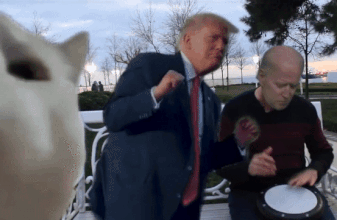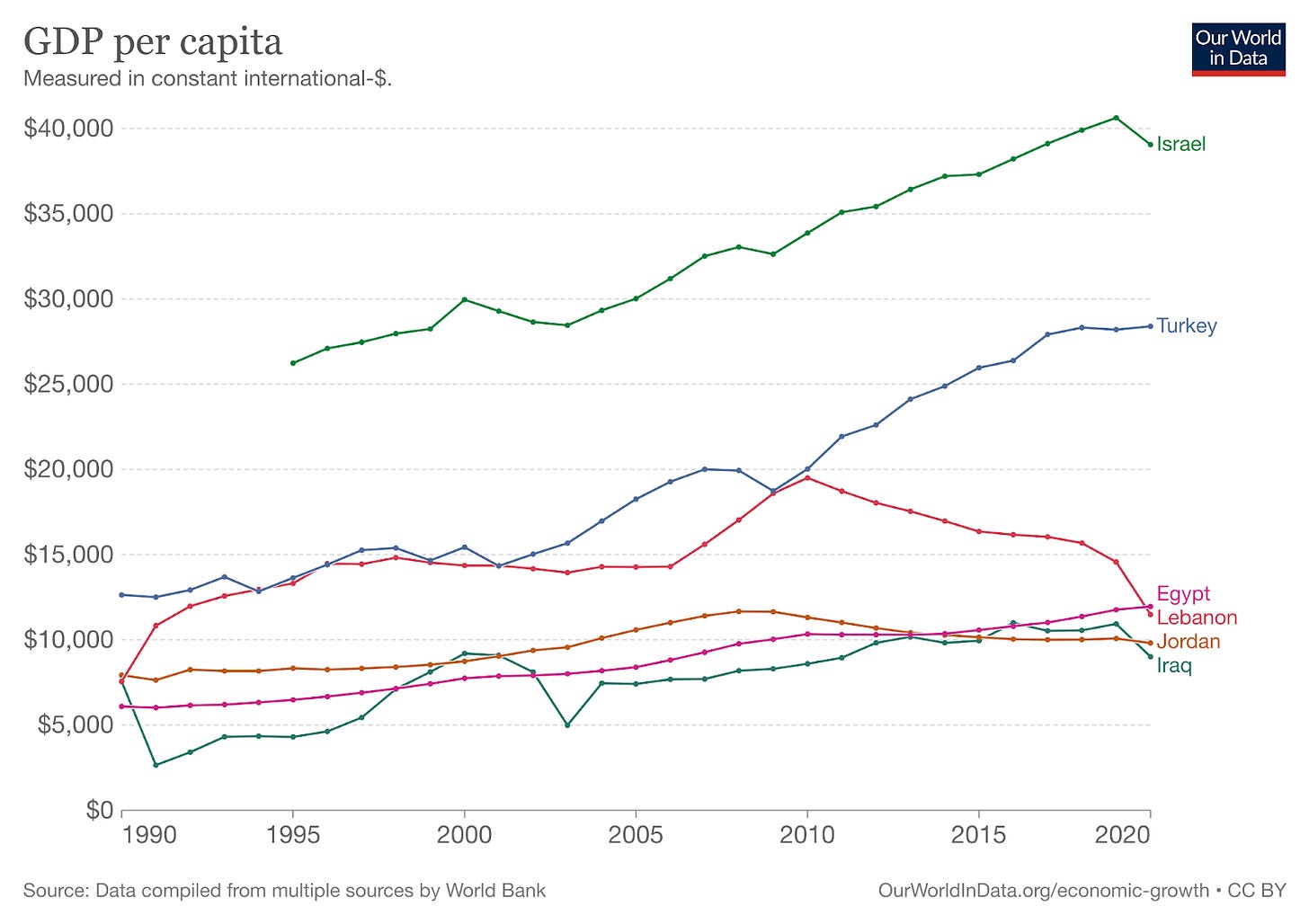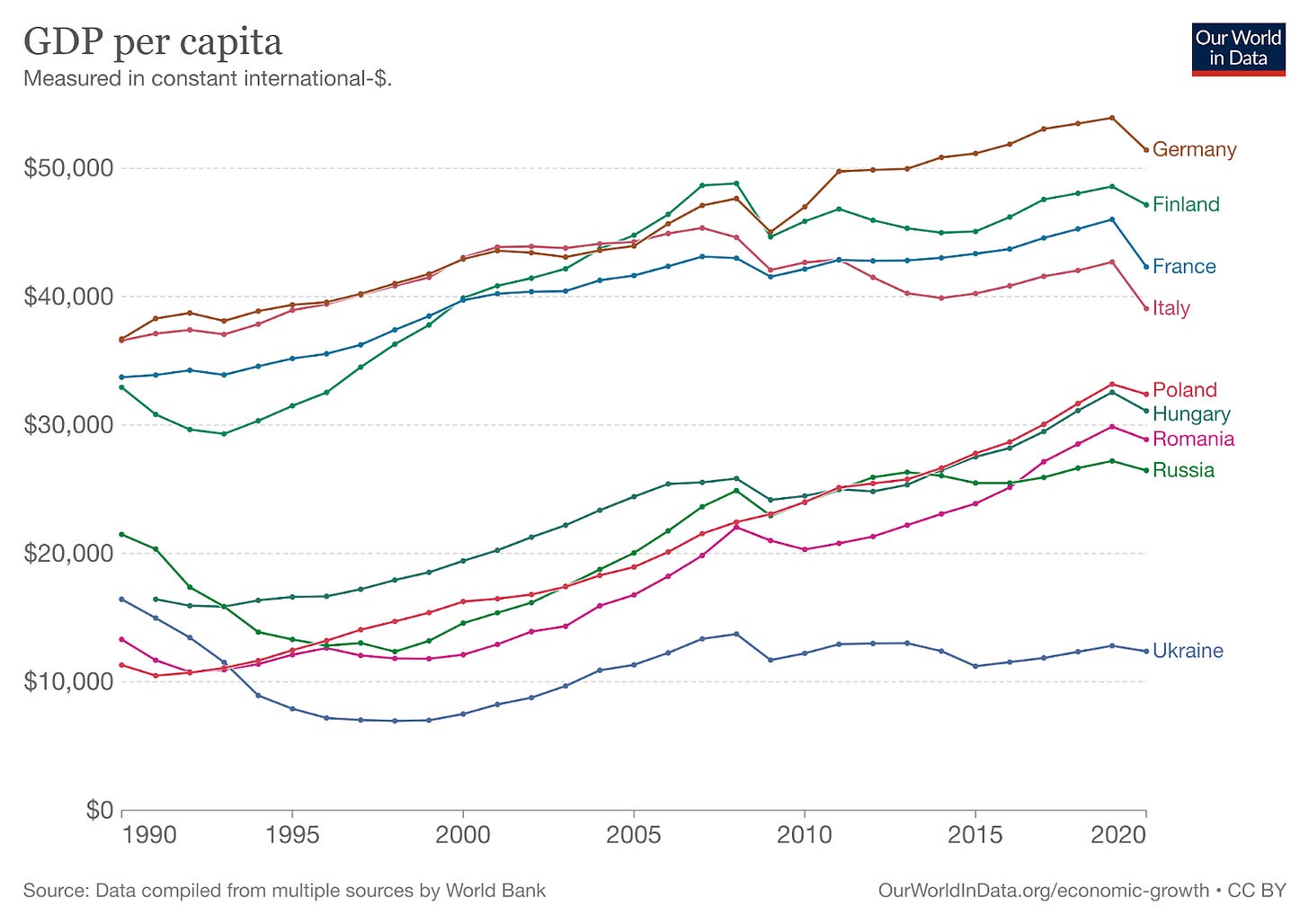Why Countries Are Shooting Themselves in the Foot
And How Putin Is Improving the World
1. Foot-Shooters
Boris Johnson is out. This is the best leader the UK could muster after world-class characters like Theresa May and David Cameron, father of the biggest shot in the foot the UK has triggered in a long time: Brexit. In this critical time of economic, geopolitical, and pandemic crises, the best leader the opposition could summon was Jeremy Corbyn.
The same year as Brexit, Americans said fuck it and elected Trump, whose foreign policy of America First was the worst shot in the foot that the US could come up with, as the leaders of a global order that needs dozens of allies across the world to remain on top. The best the opposition could summon at the time was a polarizing also-ran. Their best follow-up in 2020 was a candidate they had to hide from the public for fear he would say stupid things.
Putin has led his country into an unwarranted war that is destroying its economy, sending its elite abroad, uniting its enemies, and losing its leverage on its neighbors as they quickly develop their energy independence and military.

Turkey’s president, Recep Tayyip Erdogan, is curtailing his country’s economic development for no reason by espousing a nonsensical monetary theory that has pushed inflation above 73%.
Sri Lankans are swimming in the president’s swimming pool.
After storming the presidential palace.
Which they did because food and fuel are through the roof because the Sri Lankan rupee has plummeted because the government is defaulting because it doesn’t have enough foreign currency because the country’s exports have dropped because the government had the good idea of making the entire country grow organic food only by banning the import of fertilizers and herbicides overnight, which dropped yields and exports.
Xi Jinping became the leader of China as it was thriving. Deftly, his first focus was to fight corruption. Then, he proceeded to dismantle the tech industry, the education industry, the real estate industry, amped up the military threat to all its regional allies, and then made sure every trade partner would start moving their production abroad by closing its ports because of his blind commitment to Zero COVID policies that are untenable in an Omicron world. He could have a way out by asking Western countries for vaccines that actually work, but his pride is more important than the life and purse of his dependable citizens.

China’s neighbors, Japan and South Korea, should be staunch allies as the strongest democracies and economies of East Asia, especially given the threats from bully China and psycho North Korea. Instead, they can’t even begin to cooperate because they’re obsessed with what happened 80 years ago, when one abused the other, and they can’t agree on the right apology.
When countless trillion-dollar economies make obviously stupid blunders, you know something is wrong. What can that be? To find a hint, we don’t need to travel to a different place, but a different time: Japan in the 1600s to 1800s.
2. Navel-Gazers
Guns were introduced in Japan by the Portuguese in the 1500s.

When Japan’s civil war ended in 1603, the Tokugawa period started under a new shogun. A caste system was imposed, foreigners were forbidden entry, ship production halted for all but domestic use, and guns progressively disappeared because the Japanese thought swords were cooler.

You can only enact such measures when you don’t fear an external enemy who will invade you the moment you lay down your weapons and hold up your naïveté.
Indeed, as an island full of veteran warriors, Japan was nearly impossible to invade. The threat, if any, could only come from inside, so Japan’s new rulers banned guns. They clearly agreed with the thinking of America’s 2nd Amendment zealots: the best way to maintain a backward dictatorship is by taking away people’s guns. Japanese rulers did so for 250 years.
That only works as long as foreigners don’t call you out. Eventually, if they’re in the middle of an industrial revolution that brings them way above your own level of development, they do. That’s what Commodore Perry did when he asked the country to open up by gently knocking on Japan’s door—with cannon shots from its warships.
The exact same thing happened in China:
After the Ming beat the Mongols, [the Chinese] became isolationist. They rebuilt the Great Wall, abandoned the Silk Road, and stopped the voyages of the biggest naval fleet the world had ever seen. They also reduced the power of their civil service, which accounted for a large part of writing, thus minimizing the potential impact of the printing press.

Once unified and without a threat from northern nomads, China had no neighboring threat left, so it focused on its internal affairs. But eventually the Industrial Revolution happened in Europe, Europeans sailed the seas, and ended up humiliating China, forcing it to open up through the Opium Wars.
In both cases, the lesson was the same: if you eliminate a foreign threat, everything becomes an internal conflict—until reality comes knocking at your door.
3. External Existential Threats
The Japanese commotion after Perry’s attack led to the end of the Tokugawa Shogunate, which gave way to the Meiji Restoration. Within four decades, Japan transformed from a feudal society to a formidable military power, capable of beating a Western power. Nothing like a little external existential threat to spur you into action. The same has happened elsewhere.
Israel is by far the highest-performing economy in the Levant.
It’s the first country able to develop a tech hub outside Silicon Valley.
Ask an Israeli why their country punches above its weight, and they will tell you: Every other country can afford to fail, to lose wars. If we fail, we disappear.
Whether you talk about the 1948 Arab-Israeli war, the 1967 six-day war, or 1973’s Yom Kippur war, Israel’s neighbors only had pride and land to gain. Israel was fighting for its life.
This existential need has pushed its military to be world-class, which in turn has fostered a strong high-tech industry1.
Something similar is happening to Ukraine with Russia’s invasion, and President Zelensky’s evolution is a perfect metaphor. First, he was an actor, chosen as a fuck you to the establishment, full of corruption, in one of the poorest countries in Europe.
But now Ukraine can’t afford to fail anymore. From actor-president to war-president.
Because if Zelensky or Ukraine fail, they disappear. This is how Putin might be improving the world:










